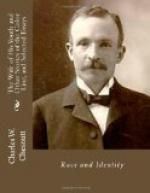“He ’s got a fevuh,” he said, after feeling the patient’s pulse and laying his hand on his brow, “an’ we ’ll hafter gib ’im some yarb tea an’ nuss ’im tel de fevuh w’ars off. I ’spec’,” he added, “dat I knows whar dis boy come f’om. He ‘s mos’ lackly one er dem bright mulatters, f’om Robeson County—some of ’em call deyse’ves Croatan Injins—w’at’s been conscripted an’ sent ter wu’k on de fo’tifications down at Wimbleton er some’er’s er nuther, an’ done ‘scaped, and got mos’ killed gittin’ erway, an’ wuz n’ none too well fed befo’, an’ nigh ’bout starved ter def sence. We ’ll hafter hide dis man, er e’se we is lackly ter git inter trouble ou’se’ves by harb’rin’ ’im. Ef dey ketch ’im yere, dey ’s liable ter take ‘im out an’ shoot ‘im—an’ des ez lackly us too.”
Cicely was listening with bated breath.
“Oh, gran’daddy,” she cried with trembling voice, “don’ let ’em ketch ’im! Hide ’im somewhar.”
“I reckon we ’ll leave ’im yere fer a day er so. Ef he had come f’om roun’ yere I ’d be skeered ter keep ’im, fer de w’ite folks ’u’d prob’ly be lookin’ fer ’im. But I knows ev’ybody w’at’s be’n conscripted fer ten miles ‘roun’, an’ dis yere boy don’ b’long in dis neighborhood. W’en ’e gits so ’e kin he’p ’isse’f we ’ll put ‘im up in de lof an’ hide ’im till de Yankees come. Fer dey ‘re comin’, sho’. I dremp’ las’ night dey wuz close ter han’, and I hears de w’ite folks talkin’ ter deyse’ves ‘bout it. An’ de time is comin’ w’en de good Lawd gwine ter set his people free, an’ it ain’ gwine ter be long, nuther.”
Needham’s prophecy proved true. In less than a week the Confederate garrison evacuated the arsenal in the neighboring town of Patesville, blew up the buildings, destroyed the ordnance and stores, and retreated across the Cape Fear River, burning the river bridge behind them,—two acts of war afterwards unjustly attributed to General Sherman’s army, which followed close upon the heels of the retreating Confederates.
When there was no longer any fear for the stranger’s safety, no more pains were taken to conceal him. His wound had healed rapidly, and in a week he had been able with some help to climb up the ladder into the loft. In all this time, however, though apparently conscious, he had said no word to any one, nor had he seemed to comprehend a word that was spoken to him.
Cicely had been his constant attendant. After the first day, during which her granny had nursed him, she had sat by his bedside, had fanned his fevered brow, had held food and water and medicine to his lips. When it was safe for him to come down from the loft and sit in a chair under a spreading oak, Cicely supported him until he was strong enough to walk about the yard. When his strength had increased sufficiently to permit of greater exertion, she accompanied him on long rambles in the fields and woods.
In spite of his gain in physical strength, the newcomer changed very little in other respects. For a long time he neither spoke nor smiled. To questions put to him he simply gave no reply, but looked at his questioner with the blank unconsciousness of an infant. By and by he began to recognize Cicely, and to smile at her approach. The next step in returning consciousness was but another manifestation of the same sentiment. When Cicely would leave him he would look his regret, and be restless and uneasy until she returned.




